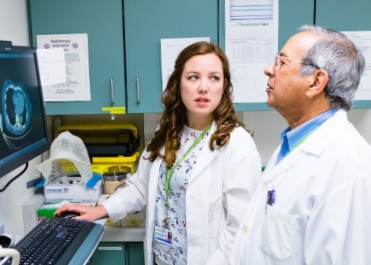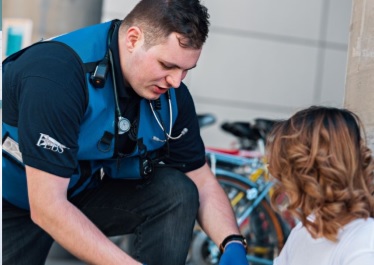Further Education
How does co-op fit with my further education plans?
How does co-op fit with my further education plans?
I choose co-op
As a Health Studies co-op student, Rachel McDonald spent five co-op work terms at Sunnybrook Health Sciences Centre. She coordinated the rapid response radiotherapy program, which provides palliative radiation treatment to advanced cancer patients. Over five co-op terms, Rachel collected, analyzed and published data as the lead author on seven papers in peer-reviewed journals. She was even flown to Miami and Copenhagen to present research on quality of life and bone metastases.
Rachel was accepted into two of Canada’s most prestigious medical schools: Queens University and University of Toronto. Now, she is in her second year of medical school at the University of Toronto.

Benefits of co-op
- Graduate with up to two years of paid work experience
- Discover which types of careers you like (or dislike!)
- Build contacts to help you start your career
- Gain self-promotion experience during the competitive co-op process
- Develop soft skills and improve employability by completing online professional development courses
I think a lot of people underestimate the power of co-op. Work hard, be diligent and take initiative to do things outside of just what the position entails.
Rachel McDonald, co-op stream
I choose regular
Honours Science student Colin Whaley appreciated the consistency of the regular stream of study, which allowed him to tailor his classes and extracurriculars during his fall/winter study terms. In just five years, Colin was able to complete three honours thesis courses (biology, health and kinesiology), work as a Teaching Assistant and publish two papers. He also volunteered with campus clubs and services like the Campus Response Team and MATES Peer Counselling Group and even co-founded his own club that has sent around 100 volunteers to deliver technology training to seniors in long-term care homes and hospitals.
After working as a researcher at the Princess Margaret Cancer Research Centre and completing the graduate program at the University of Waterloo’s School of Pharmacy, Colin was accepted to a number of Canadian medical schools. He will now be attending Michael G. DeGroote School of Medicine at McMaster University.

Benefits of regular
- Complete your degree in four years
- Have extra time to explore campus and community life
- Enjoy continuity in studies, social life and living arrangements
- Use WaterlooWorks summer job postings to find work between school years
- Develop professional skills, explore career options and learn how to market yourself by enrolling in the EDGE certificate program
Get involved, build relationships and maintain an open mind towards different fields of research and practice. This can take you down some really interesting paths.
Colin Whaley, regular stream
Applying to graduate and professional schools
It is important that you understand how your grades will be calculated, as each graduate and professional school has different rules and methods of evaluation.
They might look at one (or some) of the following factors:
- Your best two years of study
- Your last 10 credits
- Your cumulative GPA (all courses)
- A weighted calculation by year
- Another set of courses
Co-op sequence
If you are in co-op, your co-op sequence could affect the way your grades are calculated when applying to professional schools as some programs expect you to complete two study terms per academic year (typically from September-August) in order to count as a year of study or towards the grades in your GPA.
Graduate school grade calculations are not typically impacted by your co-op sequence.
Next steps
- Research and/or contact your program(s) of interest and make sure you understand their admission requirements, including:
- How your GPA will be calculated.
- If you are a co-op student, how your co-op sequence might affect how your application is received.
- If other factors like prerequisite courses, previous experience, volunteer work or extracurriculars are required/preferred.
- Make a plan for your academic, work, volunteer and extracurriculars early on with the goal of becoming a competitive candidate.
- Attend the Health Careers Conference to learn more about your area(s) of interest. https://uwaterloo.ca/career-action/healthcareersconference
- Consider booking a 1:1 appointment with a career advisor if you need support around grad or professional school applications.
- Fill out this form to request for Further Education support.
